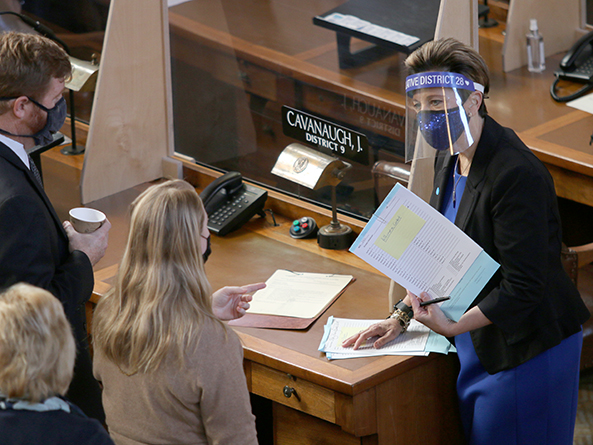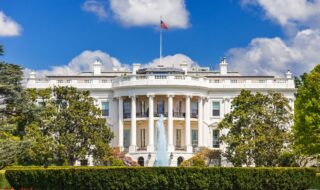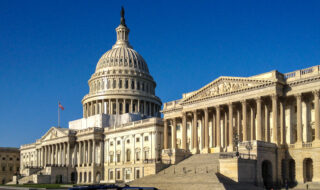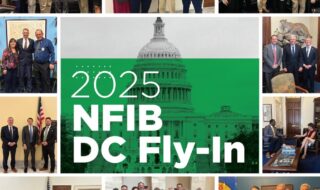March 5, 2021
Bill Limiting Property Tax Increases Advances
State Director Bob Hallstrom reports from Lincoln on the small-business agenda for the legislative and political week ending March 5
Lawmakers adjourned on Thursday for a long four-day weekend having completed the final week of “two-a-day” committee hearings. When lawmakers return next Tuesday, they will commence half-day floor debate sessions and begin by considering a few of the bills that have already been designated as priorities by individual senators.
Priority Bill Designations Await
The deadline for designating individual senator, committee, and Speaker priority bills is fast approaching. The designation of priority bills will set the agenda for the balance of the session, with non–priority bills being unlikely to receive further consideration after mid–March and only non-controversial bills eligible for “Consent Calendar” consideration having an opportunity to be debated.
The deadlines for priority bill designations are set forth below:
- March 10, 2021 – Deadline to submit letters to the Speaker requesting designation of a bill as a 2021 Speaker Priority Bill.
- March 11, 2021 – Deadline to designate committee and senator priority bills.
Each senator can select one priority bill, each committee may select two priority bills, and the Speaker is allowed to designate up to 25 priority bills.
NFIB Weighs in on Workers’ Compensation Bills
The Business and Labor Committee conducted public hearings March 1, the final day of the session for it to conduct public hearings. Among the bills heard were the following:
Workers’ Compensation
Legislative Bill 207 – Workers’ Compensation – Waiting Time
Sen. Mike McDonnell (Omaha) introduced LB 207 which would reduce the workers’ compensation “waiting time” period from seven to three calendar days and the time period to allow compensation to be paid from the date disability began from six weeks to two weeks. (NFIB Position – Oppose)
NFIB/Nebraska State Director Bob Hallstrom testified in opposition to the bill noting that it will increase workers’ compensation costs for Nebraska employers. The bill would also likely have a negative impact on the effectiveness of employer “return to work” or “light duty” programs that ease injured employees back into the workforce. Many thanks to NFIB members who responded to the Action Alert by expressing their opposition to LB 207.
With Nebraska being an “Experience Rating Adjustment” state, all WC claims that are “medical only” and which include no “indemnity” (lost wages) payments are discounted by 70 percent as they impact an employer’s “Experience Modifier Calculation.” As a result, employers can be rewarded for getting injured employees back to work quickly, with applicable, work-related restrictions as directed by the treating physician. Reducing the “waiting period” from seven to three days minimizes the ability of the employer to benefit from these provisions.
Legislative Bill 441 – Workers’ Compensation – COVID-19 Rebuttable Presumption
Sen. Matt Hansen (Lincoln) introduced LB 441, which would create a rebuttable presumption that any “essential worker” who otherwise qualifies for workers’ compensation and
- is confirmed as COVID–19 positive on or after March 13, 2020, either by a physician or by test
- has COVID–19 listed as the cause of death on the essential worker’s death certificate
- or is quarantined at the direction of the employer due to suspected COVID–19 exposure or the display of any COVID–19 symptoms to have been suffered from an accident arising out of and in the course of his or her employment.
The bill would prohibit a claim from being denied to an essential worker on the basis that the accident did not produce unexpected or unforeseen injury happening suddenly and violently and producing at the time objective symptoms of the injury.
Under the measure, an employer could rebut the presumption by affirmatively proving that the employee contracted COVID–19 outside of the workplace. COVID–19 cases would be exempted from being subject to the waiting period for payment of temporary total disability benefits and require compensation to begin from the earliest of the first date of quarantine, the date of positive testing, or the date of confirmed diagnosis of COVID–19 and continuing for the duration of the self–quarantine period that prevented the injured essential worker from returning to employment.
The measure would also prohibit such COVID–19 cases from increasing or adversely affecting an employer’s workers’ compensation insurance premium, experience rating, or modification. The bill would also exclude the notice of first injury requirement for any retroactive COVID–19 workers’ compensation claims, and only require the essential worker seeking retroactive workers’ compensation to notify his or her employer of the injury no later than two years after the effective date of the act. (NFIB Position – Oppose)
Hallstrom alerted the Committee to the fact that employees under the workers’ compensation “Grand Bargain” have the burden of proving that an injury or illness occurred in the course and scope of their employment. Establishment of a “rebuttable presumption” that an “essential worker” testing positive for COVID-19 had been suffered from an accident arising out of and in the course of his or her employment would eliminate the long-standing requirement for these types of cases.
Hallstrom also highlighted provisions of the bill that would allow an employee to notify the employer of an injury resulting from a retroactive workers’ compensation claim for up to two years after the effective date of the Act. He noted the difficulties in existing cases for which investigations take place shortly after the filing of a notice of first injury report and that having to wait for more than two years to commence investigations would make it virtually impossible to raise a credible defense to claims of this nature.
Legislative Bill 667 – Workers’ Compensation – Confidentiality of First Injury Reports
Introduced by Senator Steve Halloran (Hastings), LB 667 would require the Workers’ Compensation Court to withhold workers’ compensation first reports of injury from disclosure to the public, with certain designated exceptions for a period of 60 days (NFIB Position – Support)
Lobbyist Bob Hallstrom testified on behalf of NFIB indicating that employees typically raise concerns with the release by the employer of information regarding their workplace injuries, which is required by law and over which the employer has no control. He noted that the 60-day delay in releasing workers’ compensation first reports of injury would allow claims to progress naturally and would minimize the cases in which an employee retains counsel and loses a portion of his or her benefits when legal representation is not required.
The Business and Labor Committee has taken no action on any of these bills or on any workers’ compensation legislation previously heard by the Committee. An Executive Session to consider taking action on workers’ compensation legislation and other bills before the Committee has been scheduled for Thursday, March 11.
Committee Activity
NFIB also submitted testimony to the Business and Labor Committee on the following bills of interest to small businesses.
General Business
Legislative Bill 172 – Unemployment Insurance
Introduced by Sen. Matt Hansen (Lincoln), LB 172 would allow unemployed individuals to receive their full weekly benefit amount (one-half of an employee’s average weekly wage) even in weeks when they are paid wages in an amount of half or less of the weekly benefit amount. (Current law allows such individuals to receive their full weekly benefit amount only in weeks when they receive wages of one quarter or less of the weekly benefit amount.) (NFIB Position – Oppose)
Legislative Bill 480 – Minimum Wage
Sen. Terrell McKinney (Omaha) introduced LB 480 that would increase the minimum wage from $9 to $10 commencing January 1, 2022, and increasing by $1 each year thereafter until the minimum wage is established at $20 per hour on and after January 1, 2032, with the minimum wage to be adjusted annually thereafter an amount equal to the minimum wage from the previous calendar year increased by the percentage increase, if any, in the Consumer Price Index for all urban consumers. (NFIB Position – Oppose)
Property Tax Bill Advances
Legislative Bill 408 – Property Tax Request Act
The Revenue Committee has advanced LB 408 to General File. Introduced by Sen. Tom Briese (Albion), LB 408 would prohibit a political subdivision from making a property tax request for any year in excess of 3 percent more than its property tax request in the prior year, except that the political subdivision, by a majority vote by its board, would be allowed to exceed the 3 percent limit for no more than two consecutive years. The bill would exclude that portion of a political subdivision’s property tax request that is needed to pay the principal and interest on approved bonds, or which is derived from the real growth value for the political subdivision and the 3 percent limit would cease to apply to property tax requests after 2027. (NFIB Position – Support)
Small Business Day at the Capitol, April 7
Mark your calendar. NFIB will be co-hosting the annual Small Business Day at the Capitol on April 7, 2021. This year’s event will be held “virtually,” with the event to include discussion of bills of interest to small business and presentations by individual state senators on major issues to be addressed by the Legislature. An invitation and more information regarding the meeting will be heading your way soon.
Previous Reports and Related News Releases
- February 26—A $20-an-hour Minimum Wage?
- February 12—NFIB Members Weigh in on Paid Leave Bill
- January 15—The Legislative Bill Mill Starts Turning

NFIB is a member-driven organization advocating on behalf of small and independent businesses nationwide.
Related Articles













